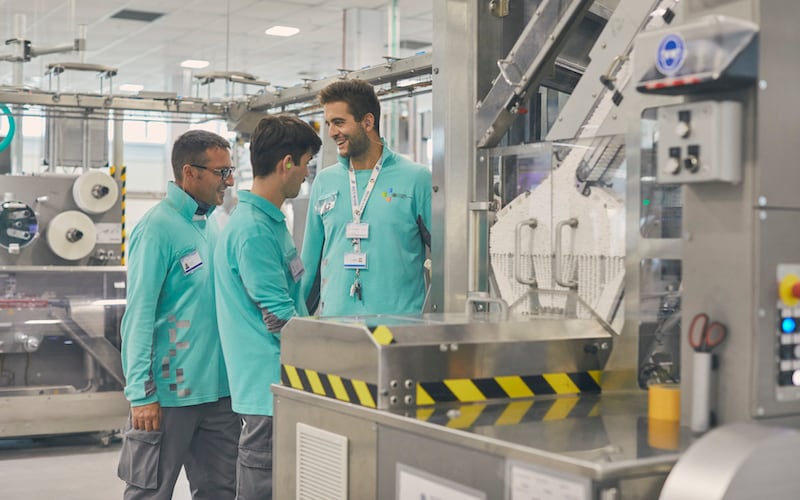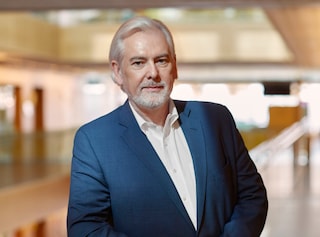The name “Philip Morris International” or “PMI” probably brings to mind terms like “tobacco company” and “cigarette manufacturer.” But today, we are much more than that. In fact, we are transforming our company and staking our future on replacing cigarettes with smoke-free alternatives.
Why are we doing this? Because it’s the right thing to do. Approximately one billion people worldwide smoke cigarettes and, based on current trends, that number is not expected to change in the near future. We want to offer adult smokers who do not quit better alternatives to continued smoking. To achieve this, we've invested more than over USD 14 billion in the research, scientific substantiation, and commercialization of our smoke-free products.
It’s time to make smoking history
Music starts.
words appear on screen reading:
We built the world's most successful cigarette company
But now we've committed to stop selling cigarettes for good.
Jacek Olczak, CEO, Philip Morris International, speaks to camera:
The evidence is clear. Smoke-free alternatives can accelerate the end of smoking.Words appear on screen reading:
That's why we have a range of products that give
adult smokers better alternatives to cigarettes.
Emmanuel Babeau, Chief Financial Officer, Philip Morris International speaks:
I believe that nobody today can seriously challenge how genuine we are in delivering this ambition.
Voiceover of Stacey Kennedy, President Americas and CEO PMI's US business, is heard:
We are building our company's future around better alternatives to smoking.
Words appear on screen:
The proof?
Over 41 million adults are now using our range of smoke-free products
in 97 markets across the globe.
Source: PMI Q2 2025 earnings.
Scott Coutts, Senior Vice President Operations, Philip Morris International, speaks to camera:
When we say we want to do something, we can change the industry as we're doing today.
Serge Maeder, Global Head of RRP System Innovation, Philip Morris International, speaks to camera:
We have a chance in the next 10 years to go full smoke-free products in PMI.
Words appear on screen:
By 2030, we aim to have more than
2/3rds of our net revenue come from our smoke-free business.
We are currently at 41%.
Source: PMI Q2 2025 earnings.
Jacek Olczak, CEO, Philip Morris International, speaks to camera:
The world has to move now to help smokers to move to the better alternative.
Words appear on screen:
All our smoke-free products are backed by science.
Stefano Volpetti, President SFP Category and CCO, Philip Morris International, speaks to camera:
We are sitting on something that can change the trajectory of public health.
Words appear on screen:
In 2020, the FDA authorized the marketing of our leading
heated tobacco brand as a modified risk tobacco product.
Badrul Chowdhury, Chief Life Sciences Officer, SFP, Philip Morris International, speaks to camera:
You actually have a product where the 100 or so chemicals
which are known to be harmful are reduced or eliminated.
That's the scientific breakthrough.
Words appear on screen: Smoke-free products are not risk-free and contain nicotine, which is addictive.
And in 2025 the FDA authorized our Number 1 nicotine pouch brand,
making it the 1st of its kind to be authorized.
Moira Gilchrist, Chief Communications Officer, Philip Morris International, speaks:
The science never stops. The investigation never stops.
And we're determined to provide the evidence that will convince regulators, not just FDA.
Stefano Volpetti speaks to camera:
We're going to get there faster if society, health regulators help us because
we have a responsibility to consumers out there to provide them with better alternatives.
Jacek Olczak speaks:
We can be saying, remember when people smoke?
It's time to make smoking history.
Philip Morris International's logo appears on screen.
Music ends
Providing alternatives: Acting now for a smoke-free future
These billion-plus adult smokers aren’t just numbers. They might be your friends, family, or neighbors. Measures to deter initiation and encourage cessation are fundamental. There is no disagreement there. The best option is to quit tobacco and nicotine altogether or even better—not to start. But for the large majority of existing adult smokers who’d otherwise continue smoking, there has to be a sensible plan. And in a world where smoking is a fact of life, we cannot simply ignore the compelling scientific evidence: scientifically substantiated less harmful products than cigarettes are now available to adult smokers who otherwise would continue smoking.
Jacek Olczak
Chief Executive Officer, Philip Morris International
The science behind our smoke-free products:
There is no debate that smoking is harmful or that nicotine is addictive. What matters is what the consumer is exposed to. For example, there is a huge difference between smoke from a burning cigarette and the aerosol from a heated tobacco product. It’s the burning process that creates the vast majority of the harmful and potentially harmful chemicals that are the primary causes of smoking-related diseases.
If science validates that there is a difference between products, shouldn’t smoke-free alternatives be treated differently? And shouldn’t the millions of men and women now smoking cigarettes know about those differences? Can you imagine the criticism that PMI would face if, at some point in the future, it was discovered that we had better alternatives to continued smoking to offer adult smokers, but had left them in the laboratory?
Transformation can’t happen without conversation
While PMI’s commitment to a smoke-free future is unwavering, and we have robust science on our side, we cannot make this journey alone. For too long, the debate around smoking has been polarized, which has led to paralysis. Without a willingness by world leaders, governments, regulators, and NGOs to look dispassionately at the scientific evidence in favor of smoke-free alternatives compared to continued smoking, transformative change will not come quickly. In the U.S., the U.K., New Zealand, and Sweden, there is a growing acknowledgement that smoke-free alternatives to cigarettes can complement existing health policies focused on prevention and cessation.
Those who are still in opposition should be aware that they are becoming disablers of public health solutions. They are blocking change, potentially denying adult smokers both access to accurate information about these smoke-free alternatives, and the opportunity to switch to them if they do not quit. This is a real opportunity.
We must seize it—and seize it together. The emotional rhetoric against the industry—which ignores scientific facts—is not helping the world’s one billion-plus adult smokers. Let's have a more open-minded debate to make a smoke-free future a reality.





